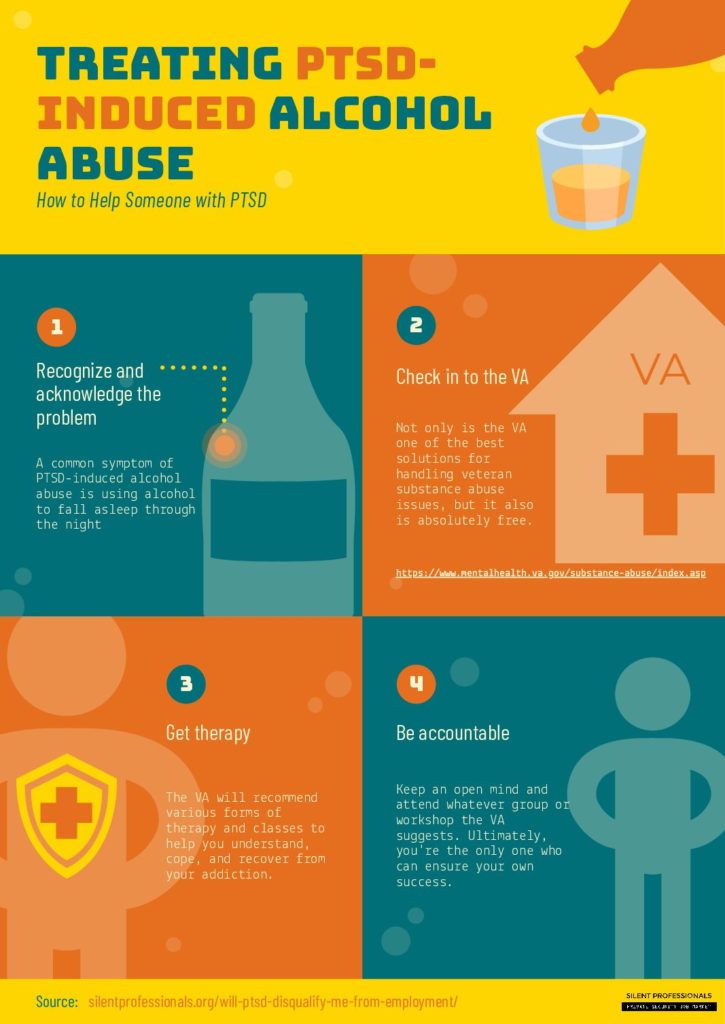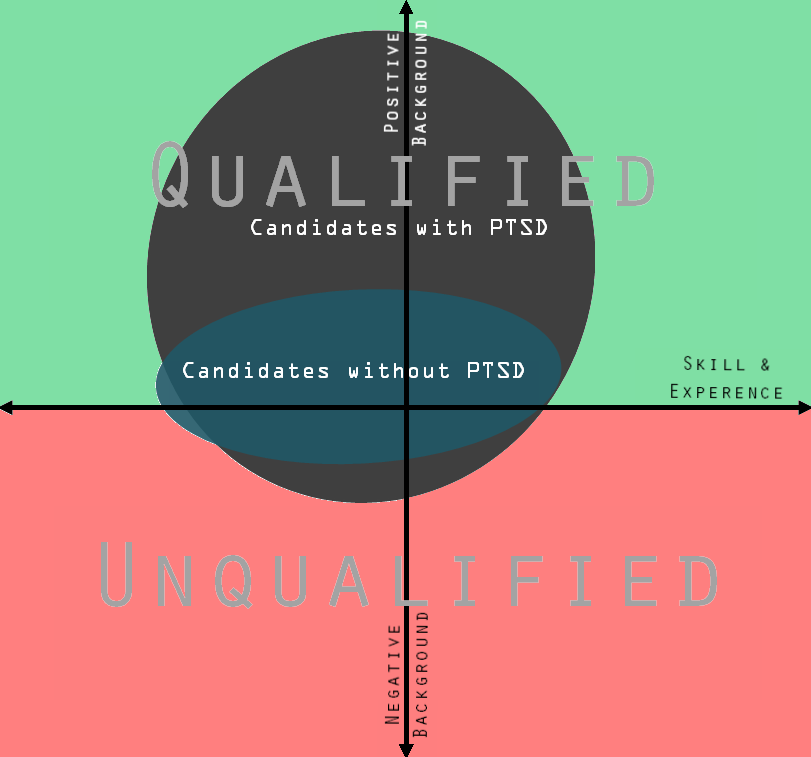If you’re reading this article, you may be working through some degree of PTSD after combat and wondering how to transition back to your civilian life, both personally and professionally. Some of you may have even abused alcohol and landed yourself in jail for a DUI/DWI while attempting to deal with your PTSD. Oftentimes, these can seem like insurmountable challenges to get back on track with your life even after treatment or rehabilitation.
So, first, let me tell you: you’re not alone.
More than half of the job seekers on Silent Professionals are combat veterans from a combat arms discipline. So, it isn’t surprising that the majority of our job seekers have a VA disability rating of some level — including a rating for PTSD.
However, VA disability ratings alone seldom tell an accurate story about the nature and severity of a veteran’s injuries and employability. In fact, disability ratings can be confusing and are often misunderstood by many people when it comes to matters of employment.
This article provides some helpful guidance to combat veterans who may be wondering how PTSD or prior alcohol abuse affects their job prospects in the security field.

PTSD and Employability
Given the fact that all of the jobs on Silent Professionals revolve around providing physical (usually armed) security, a common question that we’re frequently asked is, “Will a VA disability rating for PTSD disqualify me from a job?”
The answer is: It depends — but for the most part, no.
No employer is going to ask you about your VA disability rating for PTSD. Besides the legality of the question, a VA disability rating for PTSD is really poor way to evaluate a candidate’s mental fitness for a job.
Frankly, if PTSD was a disqualifying factor, it would eliminate the majority of the entire experienced workforce in this sector.
In fact, there are plenty of people out there who have no military background or diagnosis for PTSD who are absolutely unfit — both mentally and emotionally — for an armed private security job. That said, a security operator’s mental fitness, among other factors, is absolutely critical in determining job suitability.
After all, the end client is placing his or her complete trust in you to protect them (and their families) in an armed capacity. So, you’d better believe that your mental fitness and maturity are evaluated to a very high, exacting standard when it comes to employment in private executive protection services.

How is Mental Fitness Evaluated for a Job?
While it’s true that PTSD is a DSM-5 defined psychological condition, it’s environmentally induced (versus hereditary) with greatly varying symptoms that manifest or are triggered very differently from person to person.
So, a diagnosis of PTSD is a very poor method to determine someone’s mental fitness for a job.
Evaluating a candidate’s mental fitness for a job is more effectively determined by examining a candidate’s current and historical behaviors and actions.
Red Flags
Mentally unfit candidates almost always exhibit red flags in other areas of their lives.
These red flags are often revealed in past work performance and peer reviews, a pre-employment drug test, and/or a criminal background check.
Past Work Performance and Peer Reviews
This is one of the biggest indicators of mental fitness. If you show poor or degraded work performance or have a poor reputation among peers, not only does this reflect poor mental fitness, it also reflects a lack of maturity as a competent operator.
Conversely, if you have a consistent history of excellent past work performance and strong peer reviews, an employer may consider you for employment, even if you have a past DUI in your criminal record. I’ll cover that topic in more detail further down in this article.
PTSD or not, past work performance and peer reviews are some of the most important evaluation factors during the selection process for a competitive private security job.
Failing a Pre-Employment Drug Test
This should be obvious. If the employer has a drug and alcohol policy (which most do) and you fail a drug test you’re not going to get the job.
Most medications for PTSD are psychoactive which often preclude you from qualifying for a private security job.
If you fail a drug test, this could very well affect your future chances of employment with any employer in this sector. This is especially the case for government contractor jobs since your record will be flagged with the failed drug test.
Therefore, before you apply for a job, be sure to thoroughly read all of the employer’s requirements so that you’re not inadvertently setting yourself up for failure.
Criminal Background Checks for Employment
Criminal background checks are important in the screening process of a candidate for any job, but even more so for a private security job.
For those seeking US government or private security employment, options sometimes do exist, even if you possess criminal convictions on your record. It’s important to understand, however, that your options will be extremely limited, regardless of your experience and/or skill sets.
Derogatory criminal records often disqualify a candidate from most private security jobs with US employers. Although rare, at times, there are exceptions.
Various factors may influence an employer’s decision to consider a candidate who may have a bit of a rap sheet, such as:
1. SEVERITY OF THE CRIME
Some crimes simply will not be overlooked, no matter what. Violent crime convictions, for example, will pretty much ban you for life from work in this sector.
Additionally, any domestic violence convictions or restraining orders for domestic abuse prohibit you from possessing or handling a firearm under the Lautenberg Amendment. That’s an obvious deal-killer for any armed security job.
2. TIME SINCE CONVICTION
Depending on the employer and the type of background check being conducted, the average criminal background check is limited in scope to the past three to five years. So, if you have a DUI conviction on your criminal record that falls before the scope of the background check being conducted, you might still be considered for that job, provided that you meet all of the other qualification requirements.
3. SECURITY CLEARANCE REQUIREMENTS
Some background checks go far beyond 3-5 years. For instance, background checks for security clearances investigate all past criminal history. Therefore, if a job requires a security clearance, a prior criminal conviction of any type will prevent you from obtaining a clearance, automatically disqualifying you for that job.
Most military contractor jobs require some type of clearance. Occasionally, a DoD contract may have un-cleared positions. Un-cleared positions might be an option for an otherwise qualified candidate to gain employment within this industry. A background check will still be required, but typically these only go back 3 to 5 years.
4. WAR TIME OR PEACE TIME
During times of war, the government often needs to deploy a force beyond what the military alone offers and so they turn to private military contractors. When demand surges, certain restrictions are often loosened, and the government may accept candidates with certain types of criminal convictions.
How to Help Someone with PTSD
If you have an alcohol or drug-related criminal conviction related to PTSD or know someone who does, you may want to consider a lawyer to possibly expunge the conviction from your criminal record.
In the eyes of the law, an expungement seals or erases the legal record of a crime. Expunged records do not show up in a criminal background check as the case is sealed from state and federal searches. For clearance investigations, however, a candidate may need to disclose this even if their case has been expunged.
If expungement is an option you want to consider, laws101.com is a great resource to find veteran lawyer who specializes in criminal record expungements. Veteran lawyers can be helpful as they tend to have more empathy and understanding towards veterans who suffer from PTSD.
Alcohol Abuse or Addiction
It’s worth noting that many people with PTSD can have a clean criminal background yet still have a problem with alcohol or drug abuse. While you can slip beneath the radar and gain employment, an unchecked addiction at some point, will rear its ugly head and bite you.
There are many veterans and contractors who struggle with alcohol abuse or addiction. While we cannot analyze that in its entirety, we can look into why so many veterans and contractors with PTSD from the wars struggle with alcohol addictions and discuss ways to combat it.
If you’re a combat veteran currently struggling with alcohol abuse or addiction due to PTSD, you need to tackle it immediately. You have to take steps to regain control of your life; otherwise, PTSD will take control of you.
Step 1 – Intervention: Acknowledge the problem. Years ago, after more than a decade of working back-to-back combat-heavy contracts overseas, I medicated myself with alcohol to put myself to sleep every night because, without it, I was unable to sleep restfully. Even though inebriated sleep is far from restful, the alternative at the time was far worse.
At one point, I realized I was basically a functioning alcoholic. That’s when I turned to the VA for help. The VA helped me identify why I chose to self-medicate through alcohol and then began to treat the root cause – PTSD.
If you are strong enough to recognize that you have a problem, then the good news is you are more than halfway there. If you have a buddy that is facing these addictions or demons, do not let him go at it alone. We have always been taught in the military that you police your own. This is no different, so help a buddy out.
Step 2 – Check in to the VA. For those who are struggling with this addiction, it is important to seek professional help. One of the best resources available is actually the VA. Not only is it one of the best solutions for handling veteran substance abuse issues, but it also is absolutely free.
If you have not registered for VA healthcare, you will have to do that first. Depending on the severity of your addiction they may admit you immediately or may schedule a follow-up appointment for processing. Either way, do it. Your physical and mental health – and even your life – depend on it.
Step 3 – Get therapy. The VA has a very caring and robust system in place to help with these types of addictions. Regardless of the VA’s negative press, the VA is full of great people who truly do care and want to help. They will recommend various forms of therapy and classes to help you understand, cope, and recover from your addiction.
Step 4 – Hold yourself or your buddy accountable. Ensure you are attending whatever group or workshop the VA suggests. Remember a mind is like a parachute, it works best when it’s open.
Final Words of Advice
PTSD and substance abuse problems may seem embarrassing to admit to yourself or others. But if you hide these issues without addressing them, they will eventually cause great harm (or worse) to you as well as any future chances of employment.
Taking full responsibility for your actions and addressing your mistakes and shortcomings are the hallmarks of a mature operator. I won’t tell you that the road to getting back on track will be easy, but it is possible if you put forth the effort.

ABOUT SILENT PROFESSIONALS
At Silent Professionals, we are a small team of former and current operators who are in operational and/or direct hiring roles within various companies across several major industries; many of us have served with each other in combat at one point or another. We all personally understand that the professional transition is difficult – don’t be afraid to apply for jobs on our job board or sign up for notifications. You can also send us an email at [email protected].

